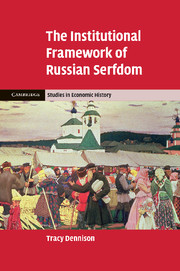Book contents
- Frontmatter
- Contents
- List of figures and tables
- Preface
- A note on the value of the rouble
- A note on transliteration
- List of abbreviations
- Glossary
- Map: Yaroslavl' and surrounding provinces
- 1 Why is Russia different? Culture, geography, institutions
- 2 Voshchazhnikovo: a microcosm of nineteenth-century Russia
- 3 Household structure and family economy
- 4 The rural commune
- 5 Land and property markets
- 6 Labour markets
- 7 Credit and savings
- 8 Retail markets and consumption
- 9 The institutional framework of Russian serfdom
- Bibliography
- Index
4 - The rural commune
Published online by Cambridge University Press: 03 May 2011
- Frontmatter
- Contents
- List of figures and tables
- Preface
- A note on the value of the rouble
- A note on transliteration
- List of abbreviations
- Glossary
- Map: Yaroslavl' and surrounding provinces
- 1 Why is Russia different? Culture, geography, institutions
- 2 Voshchazhnikovo: a microcosm of nineteenth-century Russia
- 3 Household structure and family economy
- 4 The rural commune
- 5 Land and property markets
- 6 Labour markets
- 7 Credit and savings
- 8 Retail markets and consumption
- 9 The institutional framework of Russian serfdom
- Bibliography
- Index
Summary
What was the rural commune?
The rural commune is a central feature of the Russian Peasant Myth. According to Herzen, ‘[t]he Russian peasant [had] no real knowledge of any form of life but that of the village commune’. It is thought to have been something quite unique, and to have paradoxically made the Russian peasantry both different from all others and the paradigmatic peasantry. The commune was, in the words of one scholar, ‘a local authority, an economic entity, a collective landowner, a jury-like court and a policing organ, all in one’. Russian communal practices, especially land repartitioning, are thought to have been more collectivist and egalitarian than those of other pre-modern village communities. Aleksandrov, perhaps the most widely respected Soviet scholar of the pre-Emancipation commune, maintains that ‘the centuries-long history of the peasantry in Russia is unthinkable without an understanding of the essence of the rural commune’.
But what sort of institution was this rural commune? In the historical literature, the term ‘commune’ often implies community in the sense of close-knit proximity, a dense social network, and a high degree of what is often called social capital. Commune implies the very paradigm of the ‘face-to-face society’ we associate with the pre-modern world. Thus Mironov describes the rural commune ‘as a small social grouping, that is, a group based on personal contacts, where all the members [of the community] knew each other well’. Such descriptions can be misleading, though, particularly where the pre-Emancipation commune is concerned.
- Type
- Chapter
- Information
- The Institutional Framework of Russian Serfdom , pp. 93 - 131Publisher: Cambridge University PressPrint publication year: 2011



